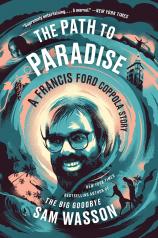The Path to Paradise: A Francis Ford Coppola Story
Review
The Path to Paradise: A Francis Ford Coppola Story
Apocalypse Now is regarded as one of the best anti-war films ever made. Based on Joseph Conrad’s HEART OF DARKNESS, it tells the story of one military man’s mission to locate a veteran who has gone mad, giving in to the craziness of jungle life in the name of finding a more authentic and honored way of life. In Francis Ford Coppola’s cinematic version, the war is Vietnam, the soldier is played by a young Martin Sheen, and the madman in the jungle is played by Marlon Brando. The story of how the movie was made is just one of the scads of insane adventures in moviemaking that Coppola has steered through in order to become one of the world’s greatest film directors.
In THE PATH TO PARADISE, accomplished biographer Sam Wasson builds his tale around the insanity of the Apocalypse Now shoot. It was a years-long travesty of bad luck, bad weather, bad health and bad vibes that somehow managed to capture in real time the madness that is war, and it has become a go-to primer in war movie photography and storytelling.
"If you have any interest in film history and the remarkably fecund and thrilling era of American moviemaking in the ’70s, THE PATH TO PARADISE is a must read."
The book takes a look at Coppola’s upbringing, his famous flutist father (who wrote all the iconic music for The Godfather), his travels in the screen trade before and after celebrity, and the personal triumphs and tribulations that drove him to become the passionate and prescient auteur that he is today.
Wasson writes with a fevered pace that is appropriate for the dramatic, passionate Coppola, weaving the story of the frenetic shoot with his introduction to important figures in his subject’s work and personal life. Among them are Roger Corman, who gave Coppola his first directing job, and George Lucas, Martin Scorsese, Steven Spielberg and John Milius, other young directors with whom he helped redefine American films in the ’70s.
Wasson does not want for drama and enhances it all with a wealth of quotes and narratives from those closest to the Coppola chaos. They include his wife, Eleanor (the documentarian who captured the Apocalypse Now shoot behind the scenes), his children (all of whom have gone into the family business), and the men and women on his crews who helped him distinguish himself from the pack with a fierce brand of storytelling that rarely has been paralleled since these classics were made.
Stuck between the studio days of old and the renegade independence of the ’70s, Coppola’s filmmaking style and ability to coerce money and business people to trust him and give him what he needed while he established his own production company, American Zoetrope, makes his story incredibly compelling. Wasson captures every tiny detail, building them into a whirlwind that manages to grasp the complexity and fervor of this master filmmaker.
Coppola is now in his 80s and is just finishing up a new complex film, Megalopolis, which is set to be released in 2024. If you have any interest in film history and the remarkably fecund and thrilling era of American moviemaking in the ’70s, THE PATH TO PARADISE is a must read. It tells its tale without brakes, storming from one intense period of Coppola’s life to another, leaving you breathless at the end of every chapter. It is a fantastic whirlwind of a biography that will make you feel as if you just finished a truly amazing film about a truly amazing man who never takes no for an answer and still believes that dreams can change the world.
Reviewed by Jana Siciliano on December 9, 2023
The Path to Paradise: A Francis Ford Coppola Story
- Publication Date: November 26, 2024
- Genres: Biography, Entertainment, Nonfiction, Performing Arts
- Paperback: 400 pages
- Publisher: Harper Perennial
- ISBN-10: 0063037858
- ISBN-13: 9780063037854



